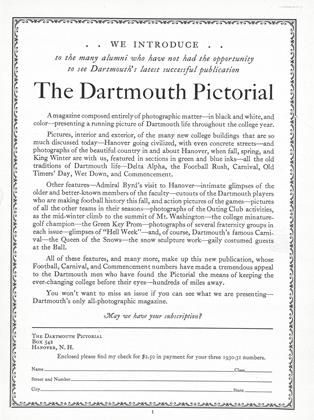INDEPENDENCE DAY was celebrated on an unusual scale in Paris this year. For the thousands of Americans either resident in Paris, or there on a holiday, the celebrations centered about two main events: the annual ceremonies at the tomb of La Fayette in the Picpus Cemetery; and the impressive dedication of a beautiful bronze "haut-relief" in honor of Mr. and Mrs. Edward Tuck.
Some of the most important personages of the French Government, the American Embassy, officials of the City of Paris, diplomats, Frenchmen and Americans distinguished in business and letters, attended the dedication of the bronze in the hall of the Maison des Nations Americaines. Conspicuous among the diplomats was Monsieur J. J. Jusserand, former Dean of the diplomatic corps at Washington.
Monsieur Renard, Prefect of the Seine, and Monsieur de Castellane, President of the Municipal Council, expressed the gratitude of the City of Paris for the benefactions of Mr. and Mrs. Tuck. Preceding them, and speaking in the name of France, Monsieur Gabriel Hanotaux, celebrated historian and member of the French Academy, had paid eloquent tribute to these "friends of France and humanity."
In the active and noble life of "le plus excellent des menages," characterized by "bonte, loyaute, sincerite, charite, gofit, discernement, bon sens," the historian brilliantly traced the "evolution de la grande democratic americaine." Confessing himself unable, because of lack of time, to enumerate all the benefactions of Mr. and Mrs. Tuck "works of charity" and "works of culture and international friendship"—Monsieur Hanotaux pointed out only those that have made the donors' names historic on both sides of the ocean.
"Whenever a humanitarian project is found to be solid, serious, useful and disinterested, there Mr. and Mrs. Tuck were sure to be found."
The speaker stressed the part played by Mr. and Mrs. Tuck in the relief of the suffering during the World War.
"They transform their mansion into a hospital for the severely wounded, without expense to the overtaxed Service de Sante. They flood our regiments with tens of thousands of gift-packages and, unique phenomenon, twelve years after the war, the spring of philanthropy has not yet dried up: still the packages go forward to the needy. From everywhere, from all corners of France, the voices of the suffering would be heard blessing the names of Mr. and Mrs. Tuck, did not their modesty impose a law of silence upon their debtors.'
Carnegie, Rockefeller, Bacon, Sharp, Herrick Edward Tuck and Mrs. Tuck. Names forever connected with international comity, with the building of the morale of two great nations; in the giving of themselves, in the giving of imperishable monuments to charity and peace and art.
"Double elite egalement inoubliable qui conduit toujours les deux peuples dans la route ouverte, pour jamais, par Lafayette at Washington."*
Briefly, simply, self-effacedly, Mr. Tuck accepted the bronze in the name of Mrs. Tuck. Replying in French, he thanked the Comite France-Amerique for having "perpetue le souvenir de Mme. Tuck at de moi-meme.'
"I am particularly grateful to you for having been so good as to include with me in this homage the wellbeloved companion of my whole life, and for having added the very delicate inscriptions that form the border of the plaquette. . .
"Enfin, mesdames, messieurs, a defaut de phrases eloquentes, permettez-moi de vous adresser a tous un simple at cordial merci, at de vous dire en terminant que j'aime de tout mon coeur votre belle France, at que je suis fier d'etre reste fidele a la noble pensee qui animait dejjl, au temps de Louis XVI, le premier message du gouvernement des Etats-Unis, lorsque celui-ci vouait a votre heroique pays une amitie eternelle."
The papers of Paris of July 5, carried laudatory accounts of the dedication and of Mr. and Mrs. Tuck's lifelong generosity: le Figaro and the semi-official Temps, in especial. The leading editorial of the NewYork Herald, entitled, "Exemplary Philanthropy," said in part: "Always modest, always generous, always wise, always effective, has been the philanthropy of Mr. and Mrs. Edward Tuck. Long dwellers in France, their charities and gifts for the general good, before, during and since the World War, have been so numerous and so habitual as now to be almost a tradition in the life of the French capital . . .
"M. Gabriel Hanotaux, recalling the steady continuance of their deeds of goodwill, used the term 'a unique phenomenon' and such it is. But it has, more broadly stated, a profound moral force, an educative meaning. It is a rare exemplar of discreet liberality which may well be followed." P.
BRONZE "HAUT-RELIEF" AT THE MAISON DES NATIONS AMERICAINES, PARIS
CHATEAU BOIS-PREAU IS AT THE TOP AND CHATEAU VERT-MONT AT THE LOWER RIGHT, THE TUCK SUMMER HOME
*The original holograph of M. Hanotaux's stirring address is now deposited among the historic documents in the archives of Baker Library. It is inscribed:"Homage a I' Universite de Dartmouth, en souvenir de Edw. Tuck at de Madame Tuck, nos excellents amis. [Signed] G. Hanotaux, Paris, 4 juillet 1930."
 View Full Issue
View Full Issue
More From This Issue
-
 Article
ArticleThe Class of 1934
November 1930 By Charles R. Lingley -
 Class Notes
Class NotesCLASS OF 1930
November 1930 By Albert I. Dickerson -
 Lettter from the Editor
Lettter from the EditorEditorial Comment
November 1930 -
 Class Notes
Class NotesCLASS OF 1913
November 1930 By Warde Wilkins -
 Class Notes
Class NotesCLASS OF 1920
November 1930 By Allan M. Cate -
 Article
ArticleA Course in the Department of Biography
November 1930 By Harold E. B. Speight
Article
-
 Article
ArticleBachelor Degrees
November 1944 -
 Article
ArticleCommencement Speaker
June 1955 -
 Article
ArticleModern Corporation
APRIL 1994 -
 Article
ArticleA Reply to Commencement Critics
June 1938 By JOHN B. STEARNS '16 -
 Article
ArticleBack Again
May 1946 By R. W. B. -
 Article
ArticleSkier Sings the Blues
DECEMBER • 1986 By Suzanne Wiley Young '77


